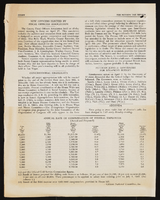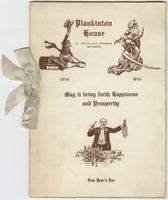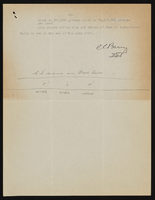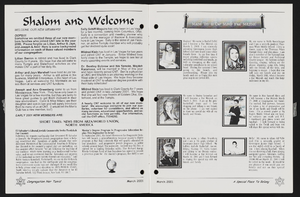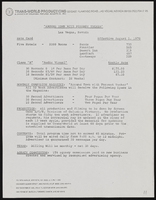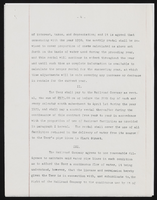Search the Special Collections and Archives Portal
Search Results

Transcript of interview with Lt. Harry Fagel by Barbara Tabach, April 15, 2016 and January 13, 2017
Date
Archival Collection
Description
In the signature line of Harry Fagel?s emails is a reads: Be the light in dark spaces. This illumines the person that Harry is both as a police officer and a poet in Las Vegas. Harry is native Las Vegan, who has served the community with the Las Vegas Metropolitan Police Department for nearly 30 years. He currently is a police lieutenant serving in Laughlin, Nevada. In addition, Fagel is a respected poet, writing both for the public and on commission. He performs in the local poetry scene. He also has showcased his poetry in two published books, released an album, and is a recipient of the Hilliard Endowment Grant from the University Nevada, Reno. Fagel is a graduate of the University of Nevada, Las Vegas, and currently lives in Henderson with his wife, Leilani and two sons, Sam and Jake. In this interview, Fagel discusses his family background, how his grandparents came to live in Las Vegas in the 1950s, as well as his relationships with both his mother and father. He recalls his early jobs which included working for his cousin Freddie Glusman?s restaurant Piero?s and for Circus Circus-long before becoming a policeman. His involvement with the Jewish community started young and he shares how it has evolved over the decades. In addition, Fagel reflects upon his career as a law enforcement officer, the progressiveness of the Las Vegas Metropolitan Police Department, and changes in relations between the police and communities, both locally and nationally. Lastly, Fagel talks in detail about his poetry, its dominant themes, and the local poetry scene.
Text

Transcript of interview with Alan Clancy by Su Kim Chung, by February 12, 2015
Date
Archival Collection
Description
Alan Clancy grew up in Sydney, Australia, the second son of famous ballroom-dancing parents. He recalls that he had incredible energy as a child, and, therefore, his parents enrolled him in the Shirley de Paul Studio to learn gymnastics, tap, ballet, and jazz. He also became a soprano singer. This training did well for him for as he went through high school he won trophies in sports and participated in musical productions. Eventually, because of a neighboring friend, Kay Dickerson, Alan moved to the Rudas Acrobatic Studio where he received further training and eventually contracted with Tibor Rudas to participate in an entertainment group called “The Las Vegas Dancers”. He was only seventeen when the group boarded a ship for Hong Kong in an enterprise which would eventually allow the dancers to entertain around the world for approximately two and a half years. When the group returned, Alan auditioned for the Tommy Leonetti television show and then for Les Girls in Sydney. Eventually Tibor Rudas appeared with a contract for Alan, when he had just turned twenty-one, to fly to Las Vegas to work in the Folies Bergere at the Tropicana Hotel and Casino. When he arrived in Las Vegas, he was surprised at the size of the city and the hotels but was overly impressed by the neon signs, the showrooms with their nude dancers, the costuming, magnificent sets, the choreography, and the dress of the patrons. He remembers his first night performing in the Folies and the amount of stars in the audience, for example, Elvis Presley, Liberace, and Zsa Zsa Gabor. Alan goes on to describe the many people that he met in Las Vegas, working in various shows, and the many friendships made over the years. However, he eventually became interested in opening his own vintage clothing store, Vintage Madness, near the Strip. He talks about his many customers, the stores around him, his creative ways of acquiring items to sell and the success that was made. Unfortunately, during the middle of one night the store burned to the ground which left Alan devastated. Eventually, however, he purchased three buildings on Fourth Street and opened an art gallery, a coffee shop, and a small stage. His mercantile interest allowed him to leave show business and briefly open a store in Laguna Beach, Southern California. It wasn’t long until Barclay Shaw asked him to work in “Splash” at the Riviera Hotel in Vegas and, therefore, he returned to show business. However, Shaw, his friend, died and so did his mother and he lost interest in his stores, renting them out. Consequently, he returned to live in California and began working with Aids patients. Alan returned to Las Vegas for the reunion of the cast of Folies Bergere and noticed the many changes made in Las Vegas from when he first arrived to perform at the Tropicana Hotel.
Text

Interview with Brenda Adams Scruton, June 29, 2004
Date
Archival Collection
Description
Text

Transcript of interview with Theresa Jones Denning by Lynn Kelstron Ballard, February 26, 1977
Date
Archival Collection
Description
On February 26, 1977, Lynn Kelstrom Ballard interviewed Teresa Jones Denning (born in Overton, Nevada in 1912) about her life in Southern Nevada. Denning first talks about her family background and her upbringing in Overton, including her life on a farm and her education in that small town. Denning also talks about her recreational pastimes before talking about the building of Boulder Dam and her life in Boulder City. Towards the end of the interview, she talks about her work as a driver for Las Vegas High School, her husband’s work on the Boulder Dam, and the changes in living conditions that she has noticed in Boulder City over time.
Text

